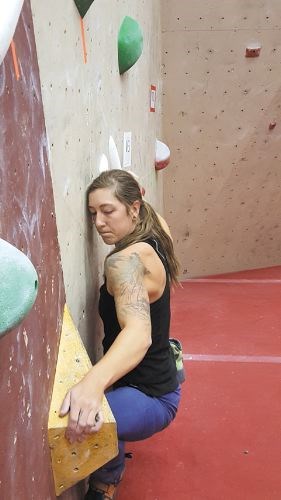In the sport of bouldering, the object is to climb a wall without ropes in as few attempts as possible - a feat known in climbing circles as figuring out the problem.
So it was only fitting that UNBC mathematics major Shota Nishi channeled his inner Spiderman to rise to the top of of the men's open class at the PEAK Throwdown Adventure Festival bouldering competition two weekends ago at OVERhang climbing gym.
Using his logical mind, vice-like finger strength and well-conditioned limbs, Shota was the only competitor in the open men's class to complete all three problems.
"I'm pretty pumped about the results, I was hoping to get all three on the first try but only the second one did I get on the first try," said Shota, who won the Prince George event in 2015 and was second last year. "The third one was definitely the most difficult. It was on a flat wall and lots of the holds are spaced farther apart and I'm not the best at those kinds of moves, but I'm still pumped I managed to pull through and get all of them together."
The 20-year-old Shota was a competitive swimmer for eight years with the Prince George Barracudas before he started sport climbing at OVERhang's facility adjacent to the Prince George Golf and Curling Club.
"I find lots of shoulder flexibility has transferred over to climbing," Shota said. "Some people can't move their shoulders a certain way but for me it may be a little earlier just because of that swimming practice and constantly moving those shoulders."
Owen Smith of Kelowna and Morgan Chambers of Coquitlam, both UNBC students, were second and third respectively. Each climber in the open final competition had three problems to solve, each within a five-minute time limit. The climber who topped the most problems in the fewest number of attempts gained the most points. To settle ties, extra points were awarded to climbers who reached bonus holds on their way to the top.
A two-and-a-half-hour preliminary event determined ranking order heading into the finals. The bouldering problems at OVERhang were mapped out by Sonnie Trotter of Canmore, a world-renowned climber featured in one of the festival's workshops.
Sport climbing includes bouldering, lead climbing and speed climbing and all three disciplines will be featured in the 2020 Olympics in Tokyo as a medal sport. Traditionally dominated by Europeans and Asians, only the top 20 men and women will qualify for the Olympics.
At its most competitive level, sport climbing has had a World Cup circuit and world championships since 1991. Unlike lead climbing and speed climbing, which require ropes and harnesses on routes which take climbers as high as 15 metres, the target heights of bouldering are about three metres. If climbers fall, which happens frequently, the floor below is padded to take the impact without injuring the climber.
Now in his third year of climbing, Shota was born in Japan and moved to Prince George with his family when he was three. He's hoping to go back to Tokyo to watch the Olympic competition live.
"No chance of competing, but I'll settle for watching," he said. "I'm definitely more of a boulderer than a lead climber but as long as I'm pulling on something and going up, I'm happy. You have to like the sport and you have to be a little masochistic. It's pretty painful starting out. The skin will literally tear from your hands, but I love it. It's so much fun."
In the women's open final, Alex Terrick of Lethbridge (also a UNBC student) edged second-place Kendall Chong of Calgary and third-place Hannah Mueller of Prince George for top spot on the podium.
Chong, a former competitive biathete and gymnast, took up climbing while she was living in Canmore and competing in biathlon with the junior national team. She moved to Prince George to study outdoor recreation and tourism management at UNBC.
"When I came here the first thing I looked for was a climbing gym and I came (to OVERhang) and met these goons," said Chong, 21, a second-year student. "I was planning to race (biathlon) last season and I had a change of heart, realized I was coming to the gym more than I was training and so I retired."
Like all of the competitors, Chong's fingertips were raw after hours of digging them into narrow handholds in what was her second-ever climbing competition, but she said it was worth the pain. Her athletic background, strength and flexibility are huge assets to her on the wall.
"I only topped one (problem), they were harder than what I was expecting but that was good - it would suck to come here and just flash everything," said Chong. "I went from skiing to climbing and I was obviously in good shape when I started climbing. I'm really small (five-foot-two) so I have a disadvantage for reach but I have the advantage of body-to-muscle ratio. I did gymnastics for eight years and that's been the base of all my sports and then eight years of biathlon. I was a very active kid and climbing came naturally to me."
In other results, Madeline Wilson and Ryan Kobylka were the respective female and male winners in the recreational class. Erin Ball captured the 10-16-year-old junior title and Maggie Beaudoin was the seven-to-nine-year-old youth champion.



